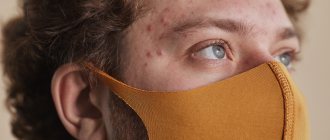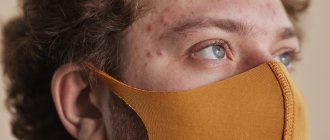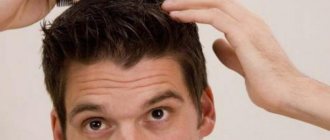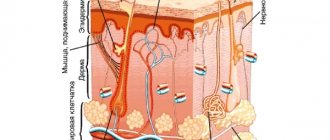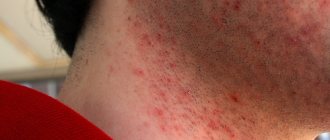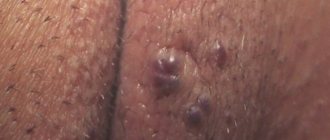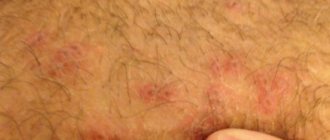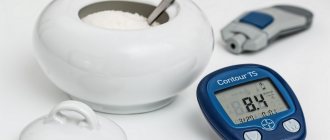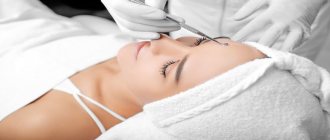Subcutaneous acne on the face before menstruation: causes
Approximately 80% of women complain of increased acne or the appearance of acne before menstruation. This usually occurs in the second phase of the menstrual cycle, approximately 10-12 days before bleeding. Scientists explain this phenomenon by the fact that due to the narrowing of the mouth of the pilosebaceous follicle, micro-edema of the skin occurs. Against the background of follicular hyperkeratosis, the outflow of sebum is hampered.40
Pathogenetically, this condition is caused by stimulation of the renin-aldosterone-angiotensin system by progesterone and estrogens with further retention of water and sodium. In the appearance of a rash on the face before menstruation, an important role is assigned to two links in the pathogenesis of acne - increased sebum production (initial link), follicular hyperkeratosis (the result of the dominance of keratinization processes over desquamation processes occurring in the ducts of the sebaceous glands). 40
The initial link may be hyperandrogenism, which manifests itself in the form of increased hormone levels (absolute) or in the form of increased sensitivity of receptors to androgens (relative). The role of androgens in the physiology of the female body has received less attention compared to progesterone and estrogens, however, their effect cannot be completely excluded from the pathogenesis of acne. 40
Non-hormonal causes of acne development
The appearance of acne during menstruation is, of course, extremely unpleasant, but it is often perceived as an almost inevitable symptom. It is much more difficult to accept the fact that acne remains on the skin even after menstruation, when hormonal levels return to normal. To understand what to do in this case, you need to find out the cause of the problem.
Non-hormonal factors for the appearance of rash include4,29:
- genetic predisposition (in 8 out of 10 cases, women suffer from acne due to poor heredity);
- unbalanced diet (smoked foods, sweets, baked goods made from white flour, hard cheeses and milkshakes, sweet carbonated drinks can cause acne during the entire menstrual cycle);
- lack of proper skin care (any type of skin, especially oily, needs regular and thorough care; at the same time, if acne appears, you should avoid some aggressive procedures such as peeling, so as not to cause even more harm to it);
- stress (nervousness and irritability often come with menstruation, but they can become an additional factor that worsens the condition of the skin);
- some strains of anaerobic bacteria.
These factors can be decisive in the appearance of acne, or they can be associated with hormonal imbalance during menstruation.
The relationship between the phase of the menstrual cycle and the appearance of acne before menstruation
The answer to the question why acne appears on the face and body before menstruation depends on what phase of the menstrual cycle the acne elements formed:
- Follicular. This phase is characterized by the active production of female hormones estrogen, which trigger cyclic processes in the body and affect the metabolism occurring in the upper layers of the epidermis. Estrogens affect the functioning of the sebaceous glands. At this time, sebum secretion decreases, as does the content of hyaluronic acid. The skin becomes drier and less protected from negative environmental factors.
- Ovulatory. During this phase, estrogen levels decrease, but progesterone concentration increases. Under the influence of this hormone, sebum production increases. But due to the activity of progesterone, immunity decreases, which allows pathogenic microflora to progress.
- Luteal and desquamatory. During these phases, hormonal levels level out. Inflammatory elements become much smaller or disappear altogether.
There is no doubt that menstruation and acne are interconnected. Changes in hormone levels are among the main causes of acne. This explains why the largest number of patients with acne are teenagers. In adulthood, the appearance of rashes along with a delay in menstruation or serious menstrual irregularities may indicate pathologies of the reproductive or endocrine systems. This is a reason to contact a specialist and undergo an examination.
Acne during menstruation
09.08.2021
Acne often be alleviated or even eliminated by taking birth control pills or other hormonal medications.
It is an unfortunate reality that most women suffer from acne during menstruation .
The menstrual cycle is based on a series of natural hormonal changes that occur in the female reproductive system. Menstruation itself is bleeding from the vagina and occurs approximately every 28-35 days.
Both the entire cycle and menstruation are processes that affect the entire body of a woman. Hormones work differently and have both positive and negative effects. Acne is one of the most unpleasant .
Causes of acne
To understand why acne occurs during menstruation , we need to understand a little better how hormones .
Just before menstruation , the level of androgens (a group of hormones such as testosterone) in the blood rises sharply and reaches a fairly high percentage. Testosterone is one of the main factors involved in this process. Testosterone promotes the activation of the sebaceous glands and the production of sebum. The oil produced by the skin is a contributing factor to the formation of acne . When it accumulates in the pores, inflammation occurs. This causes redness and then infection. Consequently, acne appears on the face , especially in the so-called T-zone.
During puberty, testosterone levels increase in both boys and girls. Numerous studies show that this is one of the main factors influencing the appearance of acne . At this stage of life, up to 70% of teenagers suffer from acne .
However, this type of acne tends to disappear in adulthood. At worst, their symptoms will decrease significantly by the age of twenty.
However, nearly 80% of adults who continue to have acne are women. This is due to the fact that throughout a woman's life, hormone continue to fluctuate. In men, in most cases it stabilizes.
During the menstrual cycle, these hormonal fluctuations lead to many changes in a woman's body. As for their effects on the skin, they can make the skin less hydrated, more sensitive, and even reduce the rate of cell regeneration. Although every woman is individual, everyone follows certain patterns. Increased oiliness in the skin during ovulation and menstruation is normal. Therefore, acne usually appears in women during menstruation or 5 days before it begins. Menstrual acne mainly affects the face , back and chest .
Fighting acne
If acne during menstruation , the first thing to do is consult a doctor - a gynecologist or dermatologist . A good specialist should take tests that will help check your hormone . Additionally, depending on the results of these studies, there are medical treatments that stabilize hormonal fluctuations.
For example, birth control pills regulate acne during menstruation . However, you need to be aware of all the side effects they cause.
It is very important to eat a balanced diet and exercise daily. Scientists are also trying to show a connection between blood and acne . Plus, eating well always helps improve the appearance of your skin.
It is worth paying special attention to acne-prone skin and caring for it properly. It is recommended to use non-comedogenic products daily, as well as to thoroughly cleanse and moisturize and avoid makeup if possible.
You should ensure that your entire body is well hydrated. Water helps eliminate toxins through sweat and urine . This helps unclog your skin's pores as sweat carries dirt and dead cells that clog them.
Published in Dermatology Premium Clinic
What to do if acne appears during menstruation?
Firstly, you should not resort to self-medication or prescribe oral contraceptives yourself. Any medications must be selected by a specialist, and he does this based on data from studies conducted. Women with acne always undergo tests to determine their hormonal status.
Secondly, acne is a polymorphic and multifactorial disease that can be triggered not only by hormonal imbalance. It is necessary to find out why it appeared. For example, one of the symptoms of PMS in many girls is an addiction to fatty and sweet foods, which can negatively affect the condition of the skin33.
Hormonal acne: what tests to take?
Acne treatment begins with a visit to a dermatologist and gynecologist, who will determine the possible causes of the disease through a comprehensive examination. The gynecologist prescribes smears for sexually transmitted pathologies (STDs and STIs), and inflammatory processes. A blood test for RW (syphilis) and HIV is mandatory. The dermatologist prescribes a whole range of specific tests of blood, urine, and skin.
Since women with acne are expected to have a disorder of the endocrine system, they need to undergo laboratory diagnostics to determine their hormonal status. The list of tests includes a mandatory test for the concentration of adrenal hormones. Paired glands located at the apex of the kidneys produce three groups of steroid hormones: mineralcorticoids, glucocorticoids, and sex hormones: androgens, estrogens, progesterone. The doctor prescribes a blood test for testosterone, dihydrotestosterone, progesterone, estradiol, FSH (follicle-stimulating hormone). It is also necessary to check the level of thyroid hormones: TSH, T3, T4. In addition, doctors prescribe general and biochemical blood and urine tests.
Is it possible to avoid acne after menstruation?
Women may be prescribed COCs, but oral contraceptives themselves are not an anti-acne agent9. Combination therapy with the use of drugs that affect the pathogenesis of acne is necessary. These include azelaic acid9. It has anti-inflammatory, antibacterial, keratolytic, and sebum-regulating effects2.
Azelaic acid is the main active ingredient of Azelik® gel. The base also contains excipients - emollient squalane, dimethicone and methylpyrrolidone. The drug must be used 2 times a day. Azelik gel is applied to previously cleansed, dry skin.5
*acne
How to cure hormonal acne
Chronic inflamed acne on the face due to hormonal imbalance is treated exclusively in an inpatient or outpatient setting based on a confirmed diagnosis. The doctor prescribes hormonal therapy according to a special regimen, prescribes a diet and gives recommendations for mechanical cleaning and treatment of the affected areas of the epidermis. Treatment of identified gynecological ailments and vitamin therapy are mandatory. All stages of complex treatment, used together, and under the strict supervision of a dermatologist and gynecologist, will allow a woman to get rid of a serious problem and live enjoying clear facial skin.
Ways to prevent acne before menstruation
It is easier to prevent any dermatological problem than to look for a treatment method later. Answering the question of how to deal with acne before menstruation, we can offer the following options.
It is possible to influence the situation in a radical way, fundamentally eliminating the cause of acne. We are talking about regulating hormone levels (including the culprit - progesterone) with the help of contraceptives. These can be mini-pills, spirals, and patches. It is important to understand the level of responsibility for making such a decision. Do not prescribe pills yourself, read the instructions and carefully consider the possible consequences of taking them. Usually, from the very first menstrual cycle, the level of progesterone no longer increases, due to the absence of the need to fertilize the egg. Which entails the normalization of skin secretion and acne no longer appears.
If the reason for the formation of acne lay in the level of progesterone, then with the start of taking contraceptives, problematic skin will clear up and new acne will stop appearing before menstruation.
Limit direct skin contact with alcohol, alcohol-containing cosmetics, concentrated essential oils and perfumes in the period leading up to menstruation. This time is characterized by an increase in skin sensitivity, therefore the manifestation of nonspecific allergic reactions is possible. They can be in the form of a rash or redness.
Always take proper care of your skin. A complete care package includes nutrition, cleansing and toning. During the indicated period, there is no need for additional cleansing of the skin. Frequent washing and cleansing the face with milk, soap, and scrub lead to even greater activation of the sebaceous glands, which strive to restore the water balance of the skin. Scrubs, gommages, antioxidant and abrasive masks are effectively used once or twice a week, alternating products.
By keeping your skin healthy and clear throughout your menstrual cycle, you can help prevent acne from developing during the potentially difficult period after ovulation and before your period.
To prevent breakouts, follow these tips:
- Choose only high-quality decorative cosmetics that allow the skin to breathe and do not clog pores. Modern foundations are lightweight and made from natural ingredients. Therefore, choosing the right one for any skin type will not be difficult. The same applies to care products. Don’t skimp on them if you don’t want to see rashes of unknown origin on your own face.
- Eat right and drink plenty of fluids. The skin needs nutrition from the inside, the quality of sebum depends to some extent on the diet, a well-moisturized epidermis produces collagen better and is less susceptible to the appearance of wrinkles.
- Strengthen your immune system to prevent bacteria from taking advantage of your vulnerability. This includes proper nutrition, healthy sleep, and exercise. These measures will not only improve the condition of the skin, but will also help cope with premenstrual syndrome itself.
To prevent the appearance of acne on the body and face before menstruation, it is important to prepare the body for a hormonal surge. Healthy skin, good immunity, and a competent approach to hygiene procedures will help keep your face clean and minimize the likelihood of acne.
